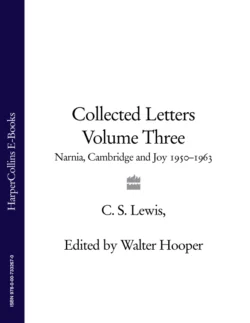Collected Letters Volume Three: Narnia, Cambridge and Joy 1950–1963

Клайв Льюис и Walter Hooper
Тип: электронная книга
Жанр: Фэнтези про драконов
Язык: на английском языке
Стоимость: 2327.96 ₽
Статус: В продаже
Издательство: HarperCollins
Дата публикации: 16.04.2024
Отзывы: Пока нет Добавить отзыв
О книге: This collection brings together the best of C.S. Lewis’s letters, many published for the first time. Arranged in chronological order, this final volume covers the years 1950 – the year ‘The Lion, the Witch and the Wardrobe’ was published – through to Lewis’s untimely death in 1963.C.S. Lewis was a most prolific letter-writer and his personal correspondence reveals much of his private life, reflections, friendships and feelings. This collection, carefully chosen and arranged by Walter Hooper, is the most extensive ever published.In this great and important collection are the letters Lewis wrote to J.R.R. Tolkien, Dorothy L. Sayers, Owen Barfield, Arthur C. Clarke, Sheldon Vanauken and Dom Bede Griffiths. To some particular friends, such as Dorothy L. Sayers, Lewis wrote over fifty letters alone. The letters deal with all of Lewis’s interests: theology, literary criticism, poetry, fantasy, children’s stories as well as revealing his relationships with family members and friends.The third and final volume begins with Lewis, already a household name from his BBC radio broadcasts and popular spiritual books, on the cusp of publishing his most famous and enduring book, ‘The Lion, the Witch and the Wardrobe’, which would ensure his immortality in the literary world. It covers his relationship with Joy Davidman, subject of the film ‘Shadowlands’, and includes letters right up to his death on 22 November 1963, the day that John F. Kennedy was assassinated.